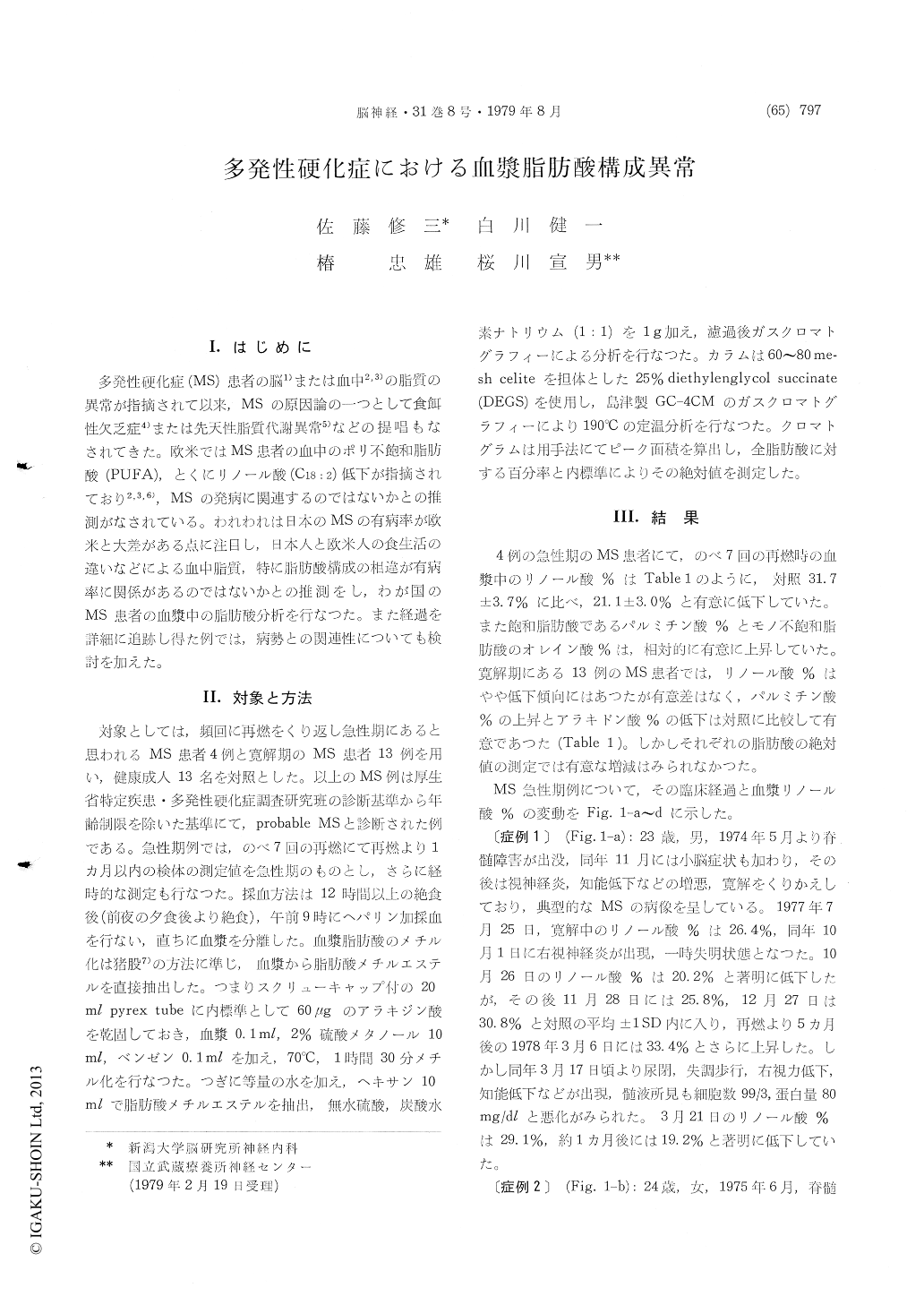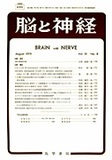Japanese
English
- 有料閲覧
- Abstract 文献概要
- 1ページ目 Look Inside
I.はじめに
多発性硬化症(MS)患者の脳1)または血中2,3)の脂質の異常が指摘されて以来,MSの原因論の一つとして食餌性欠乏症4)または先天性脂質代謝異常5)などの提唱もなされてきた。欧米ではMS患者の血中のポリ不飽和脂肪酸(PUFA),とくにリノール酸(C18:2)低下が指摘されており2,3,6),MSの発病に関連するのではないかとの推測がなされている。われわれは日本のMSの有病率が欧米と大差がある点に注目し,日本人と欧米人の食生活の違いなどによる血中脂質,特に脂肪酸構成の相違が有病率に関係があるのではないかとの推測をし,わが国のMS患者の血漿中の脂肪酸分析を行なつた。また経過を詳細に追跡し得た例では,病勢との関連性についても検討を加えた。
It has been reported that the composition of fatty acid is abnormal in the blood of Europian patients with multiple sclerosis (MS). The purpose of the present paper is to confirm such a abnormality in Japanese MS.
The material comprised of four cases of active MS (within one month after relapse), thirteen cases of remitted MS and thirteen healthy adult as control. Blood samples were taken from all subjects after an over night fast. Plasma was obtained after centrifugation of heparinized blood. Precisely 0.1 ml of the plasma placed into 20 ml screw capped tube, and methanolysis was performed with 10 ml of 2% methanolic H2SO4 for one hour 30 minutes at 70℃. Fatty acid methyl esters were extracted with 10 ml of hexan and separated by gas-liquid chromatography using a 1.5 m glass column packed with 25% diethyleneglycol succinate (DEGS) on 60-80 mesh celite at 190℃. The chromatograms were analysed by triangulation of the peaks and the individual fatty acids expressed as a percentage of total fatty acid.
The level of linoleic acid was decreased signifi-cantly in active stage at seven relapses in four cases of MS (Table 1). While the level of plasma linoleic acid was decreased the non-essential fatty acids oleate and palmitate showed significant in-crease in these relapses. In thirteen patients with MS who were in remission, the level of arachidonic acid was decreased. As indicate in Fig. 1-a to d, clinical courses were correlated to linoleic acid levels in four cases of active MS. The level of linoleic acid was decreased at each relapse and was recovered in remission.
Various hypotheses have been built up about the relationship between fatty acid abnormalities and pathogenesis of MS. In the mammalian diet, linoleic acid is the essential fatty acid and arachidonic acid, which is the delivative of linoleic acid, is the major polyunsaturated fatty acid (PUFA) of the mammalian brain. One of hypo-theses is the relationship of fatty acid abnormalities of cell membranes, included myelin, in the central nervous system to the pathogenesis of MS. On the other hand, it is suggested that the level of PUFA in the blood may be related to the immuno-logical pathogenesis of MS. In previous papers PUFA was shown to be immunoinhibitory in vitro and in vivo, moreover PUFA rich diet decreased susceptibility to the experimental allergic enceph-alitis, and reduced the frequency and the severity at relapses of MS (Miller et al, 1973). Our study confirmed fatty acid abnormalities in the blood of Japanese MS as like as Europian MS. However, it is unknown that the change of linoleic acid level is primary or not, the low level of linoleic acid may be one of the triggers of relapse in MS. We also are interested in the relationship between prostaglandins and arachidonic acid which plasma level is low in our remitted MS. Prostaglandins are products of PUFA, and have many functions, one of which the immunoinhibitory function may be related MS.
The reseach in this field could be applied to the treatment for the patients with MS and to the means of revealing the basic mechanism of demye-linating processes.

Copyright © 1979, Igaku-Shoin Ltd. All rights reserved.


